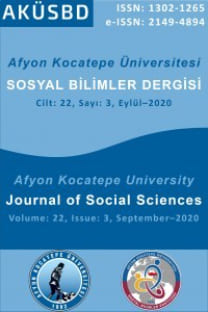Yugoslavya’nın Dağılma Sürecinin Araçsalcı Bir Yaklaşımla Analizi
An Instrumentalist Analysis on the Dissolution of Yugoslavia
Yugoslavia, nationalism, instrumentalism,
___
- Anderson, B. (1991). Imagined Communities: Reflections on the Origin and Spread of Nationalism, Londra: Verso.
- Armstrong, J. A. (1982). Nations before Nationalism, Chapell Hill: University of North Carolina Press.
- Bayram, M. & Emiroğlu, H. (2015). Hırvat Milliyetçiliğinde Dil Unsurunun Rolü, Uluslararası Hukuk ve Politika, 11(43): 56-80.
- Biondich, M. (2011). The Balkans: Revolution, War, & Political Violence since 1878. Oxford: Oxford University Press.
- Brass, P. R. (1991). Ethnicity and Nationalism: Theory and Comparison, New Delhi: Sage Publications.
- Çelik, A. B. (2011). Etnik Çatışmaların Çözümünde Siyaset Bilimi ve Uyuşmazlık Çözümü Yaklaşımları, İçinde: Çatışmadan Uzlaşmaya: Kuramlar, Süreçler ve Uygulamalar (Ed: N. Beriker), İstanbul: İstanbul Bilgi Üniversitesi Yayınları, 163-188.
- Denich, B. (1994). Dismembering Yugoslavia: Nationalist Ideologies and the Symbolic Revival of Genocide, American Ethnologist, 21(2): 367-390.
- Deutsch, K. W. (1962). Nationalism and Social Communication, Massachusetts: M.I.T. Press.
- Eller, J. D. & Coughlan, R. M. (1993). The Poverty of Primordialism: the Demystifications of Ethnic Attachments, İçinde: Ethnic and Racial Studies (Ed: Anthony D. Smith), Londra: Routledge, 183-202.
- Emiroğlu, H. (2013). Uluslararası Politikada Yaşanan Dönemsel Gelişmelerin Balkanlar Bölgesine Etkisi ve Yarattığı Güvenlik Sorunları, Avrasya Etüdleri, 44: 111- 140.
- Fearon, J. D. & Laitin, D. D. (2000). Violence and Social Construction of Ethnic Identities, International Organisation 54(4): 845-877.
- Geertz, C. (1973). The Interpretation of Cultures, New York: Basic Books. Gellner, E. (1983). Nations and Nationalism, Oxford: Blackwell.
- Hah, C. & Martin, J. (1977). Towards a Synthesis of Conflict and Integration Theories of Nationalism, World Politics, 27(3): 361-386.
- Hechter, M. (1975). Internal Colonialism: The Celtic Fringe in British National Development, Londra: Routledge.
- Hobsbawm, E. J. & Ranger, T. (1983). The Invention of Traditions, Cambridge: Cambridge University Press.
- Hobsbawm, E. J. (1990). Nations and Nationalism since 1780, Cambridge: Cambridge University Press.
- Hutchinson, J. (1987). The Dynamic of Cultural Nationalism: The Gaelic Revival and the Creation of the Irish Nation State, Allen & Unwin.
- Jelavich, C. (1990). South Slav Nationalisms: Textbooks and Yugoslav Union Before 1914, Ohio: Ohio Uniersity Press.
- Jović, D. (2001). Razlozi za Raspad Socijalistiĉke Jugoslavije: Kritiĉka Analiza Postojećih Interpretacija, Časopis za Književnost i Kulturu, i Društvena Pitanja, 62(8).
- Kadijević, V. (2010). Против Удар: Моје Виђење Распада Југославиј,. Belgrad: IP Filip Višnjić. Kedourie, E. (1994). Nationalism, Oxford: Blackwell.
- Llobera, J. R. (1999). Recent Theories of Nationalism, ICPS Working Papers, 1-26.
- Llobera, J. R. (1994). The God of Modernity: The Development of Nationalism in Western Europe, Oxford: Berg Publishers.
- Lukic, R. & Lynch, A. (1999). Europe from the Balkans to the Urals: Disintegration of Yugoslavia and of the Soviet Union. New York: Oxford University Press.
- Nairn, T. (1981). The Break-up of Britain: Crisis and Neo-Nationalism, Londra: Verso.
- Obradović, M. (2007). Raspad Jugoslavije i Strukturalna Društvena Dezintegracija Istočne Europe u Procesu Tranzicije Nakon 1989. Godine, Momčilo Mitrović (Ed.). Pisati Istoriju Jugoslavije: Viđenje Srpskog Faktora içinde. Belgrad: Altera.
- Özkırımlı, U. (2013). Milliyetçilik Kuramları: Eleştirel Bir Bakış, Ankara: Doğubatı.
- Petković, A. D. (2013). SAD i Raspad Jugoslavije: Američka Diplomatija i Balkanski Konflikt 1989-1995, Doktorska Disertacija, Univerzitet u Beogradu Filozofski Fakultet.
- Sancaktar, C. (2008). 1980 Sonrası Yugoslavya’da Sırp ve Boşnak Milliyetçiliği, Uluslararası Balkan Kongresi, 89-121.
- Serbian Academy of Sciences and Arts (SANU) (1989). Tekst Nedovrsenog Memoranduma. Duga.
- Shils, E. (1957). Primordial, Personal, Sacred and Civil Ties, British Journal of Sociology 8(2): 130-145.
- Smith, A. D. (2009). Ethno-Symbolism and Nationalism: A Cultural Approach, Oxon: Routledge.
- Smith, A. D. (1998). Nationalism and Modernism: A Critical Survey of Recent Theories of Nations and Nationalism, Londra: Taylor & Francis Group.
- Smith, A. D. (1995). Nations and Nationalism in Global Era, Cambridge: Polity Press.
- Smith, A. D. (1986). The Ethnic Origins of Nation, Oxford: Basil Blackwell.
- Tudjman, F. (1990). Bespuca Povijesne Zbiljnosni, Zagreb: Matica Hrvatska.
- Van der Berghe, P. L. (1987). The Ethnic Phenomenon, Connecticut: Greenwood Publishing.
- Volkan, V. (1988). The Need to Have Enemies and Allies: From Clinical Practice to International Relationships, Northvale: Jason Aronson.
- Vuckovic, G. (1997). Ethnic Cleavage and Conflict: The Sources of National Cohesion and Disintegration, The Case of Yugoslavia, Londra: Ashgate.
- Woodward, S. L. (1995). Balkan Tragedy: Chaos and Dissolution After the Cold War, Washington: Brookings Institution.
- Yaşın, G. K. (2006). An Era Ends in the Balkans, Birleşmiş Milletler Türk Derneği Dergisi, 14.
- Žunić, D. (1999). Nacionalizam i Književnost: Srpska Književnost, 1985-1995. Budapeşte: OSI.
- ISSN: 1302-1265
- Yayın Aralığı: Yılda 4 Sayı
- Başlangıç: 1999
- Yayıncı: Afyon Kocatepe Üniversitesi Sosyal Bilimler Enstitüsü
Çalışanların Psikolojik Sermaye Alt Boyutlarının Demografik Özellikler Bağlamında Değişkenliği
Cem ŞEN, İbrahim Sani MERT, Kemal EROĞLUER
Rekreasyonel Liderlik ve İş Etiği: Animasyon Personeli Üzerine Bir Araştırma
Şerif Ahmet DEMİRDAĞ, Evren GÜÇER
Perihan ŞIKER, Hülya Tuğçe ÜLGER
Amerikan Basınında Türk-Ermeni Ortak Mandası Tartışmaları (1919-1920)
Sadık SARISAMAN, Burak ÇALIŞKAN
Yerel Kalkınmada Teknopark Modeli: Emilia-Romagna (İtalya) ve Shannon (İrlanda) Bölgeleri Örnekleri
Foodstagramming ve Tatil Deneyimine Etkisi
Küresel Krize Heterodoks Bir Yaklaşım: Avusturya Okulu
Abdülkerim ÇALIŞKAN, Ali BALKI
Ayşegül KUTLUK BOZKURT, Cevdet Avcıkurt
İstanbul’un Şehir Tarihine Ayna Tutan Bir Tarihî Polisiye: İstanbul Hatırası
